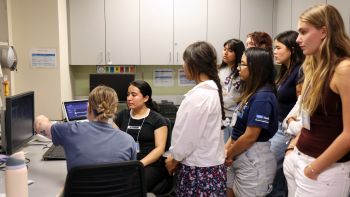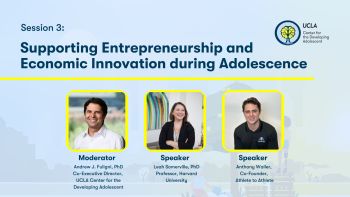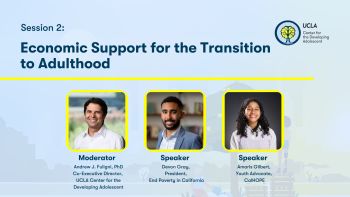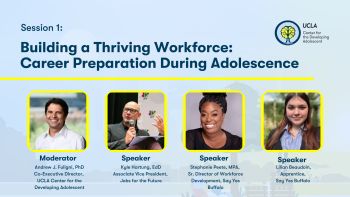Blog

Using Science and Rejecting Stereotypes To Improve Adolescent Sleep
September 4, 2025This blog post, written by high school students who attended the 2025 Summer Research Boot Camp in Adolescent Development, explores the need and importance of sleep during adolescence and offers innovative solutions to help young people get more sleep during this critical period of growth and development.

Exploring the Remarkable Adolescent Brain as an Adolescent
August 27, 2025During the 2025 Summer Research Boot Camp, high school students from around the state came together for two weeks to learn about the developing adolescent brain. This blog post was written by some of the students and explains what they learned about brain and social development, and how it will inform their perspectives moving forward.
_350_233_80.jpg)
How the Science of Contribution Can Inform Community Programs
August 5, 2025During adolescence, the ages of 10 to 25, immense physical and cognitive growth expands our ability to understand, support, and care for those around us. These years are a critical time in development when young people build the skills necessary to give back to their communities, and when brain and social development increase our capacity to contribute. Opportunities to contribute, to reflect on the meaning of our contributions, and to have our contributions recognized are all important for the future health and well-being of young people.
Press Releases
February 25, 2025: Announcing the UCLA Center for the Developing Adolescent’s 2024 Annual Report
January 17, 2023: New Guides Help Organizations Build Effective Youth Engagement Programs
August 16, 2021: New Report Examines Intersection of Anti-Black Racism on Youth Development
November 30, 2020: Center for the Developing Adolescent Announces New Advisory Board Members
October 1, 2020: Center for the Developing Adolescent Announces New Leadership
Stay in the Know

What the Research Says About Supporting LGBTQ+ Youth
June 30, 2025This month, in honor of Pride, we spoke with NSCA member Stephen Russell about the research on how to support young people who identify as LGBTQ+ in ways that enhance their own health and well-being, which also benefits the communities where they live.

Supporting Entrepreneurship and Economic Innovation during Adolescence
May 30, 2025Research has shown that adolescents are exceptional learners and are more willing than adults to explore situations with uncertain outcomes. In the last session of the 2025 Adolescent Development Symposium, researchers and young entrepreneurs discussed why brain development during adolescence makes us particularly inclined to innovate and participate in entrepreneurship, and how this can be a way for young people to take positive risks and even set them up for future success.

Economic Support for the Transition to Adulthood
May 29, 2025Transitioning to the responsibilities and demands of adulthood can be both exciting and challenging for us all. But without support, the challenges can make the path to a financially secure adulthood more difficult, as young people need to prioritize securing necessities like housing or food, and delay or forego opportunities that could increase their economic mobility. In the second session of the 2025 Adolescent Brain Development Symposium, researchers, policymakers, and youth advocates discussed how we could use financial assistance to help young people navigate this transition to adulthood and how we should implement these types of programs.

Building a Thriving Workforce: Career Preparation During Adolescence
May 27, 2025“Workforce development and focusing on career preparation is fundamentally a developmental question,” says Andrew Fuigni, co-executive director of UCLA CDA, to kick off the first panel discussion of our 2025 Adolescent Brain Development Symposium on economic opportunity.
So, how do we create career preparation policies and programs that effectively support young people in the pursuit of meaningful careers while integrating developmental science to support positive development and future outcomes?

The Opportunities and Effects of Climate Action on Adolescents
April 28, 2025Adolescence is a period of significant brain and social development, when we are particularly sensitive to the world around us. This sensitivity can create challenges to young people’s mental health and well-being when they experience or are exposed to information and images about climate change. But these changes can also increase youth’s motivation to participate in climate action, which can mitigate these negative effects while providing an opportunity for them to fill key developmental needs.
_350_175_80.jpg)
Early Adolescence as an Important Window of Opportunity for Positive Development
March 27, 2025Early adolescence is a critical window of opportunity to set up young people for a healthy and thriving adulthood. This month, we talked to a leading expert in early adolescent development, Dr. Ron Dahl, about what exactly early adolescence is and why it is so crucial to support young people as they go through this period of development.
_350_197_80.jpg)
The Importance of Peer Relationships and Platonic Love During Adolescence
February 26, 2025Friends have a new importance to us as we enter adolescence. During adolescence, we become more sensitive to positive feelings from belonging, acceptance, and mattering to others. Forming friendships becomes more important to us, and is necessary for healthy development. Hear from experts, practitioners, and young people as they discuss the importance of peer relationships during adolescence. This post is based on the Love in Adolescence: The Importance of Friendships and Platonic Love webinar discussion.
